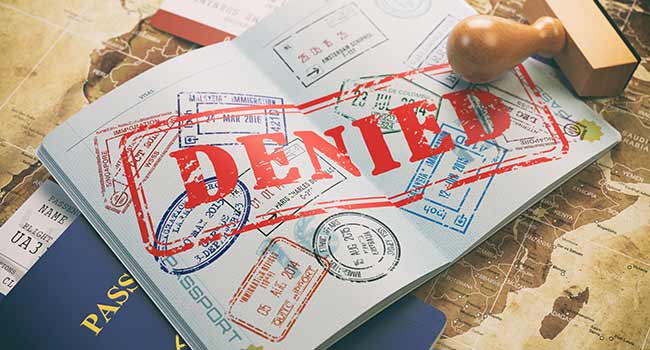A cloud of uncertainty looms over Ghana as the United States considers expanding its travel ban to include more countries. This possible move—intended primarily to bolster American national security and address perceived deficiencies in immigration vetting—could disrupt lives and livelihoods in Ghana.
An internal memo was reportedly dispatched by the US State Department to diplomats in about two dozen African nations, as well as others in Central Asia, the Caribbean, and several Pacific Island countries. In the diplomatic memo, signed by US Secretary of State Marco Rubio, the State Department outlined a dozen concerns about the countries in question and called for corrective action.
“The Department has identified 36 countries of concern that might be recommended for full or partial suspension of entry if they do not meet established benchmarks and requirements within 60 days,” the memo stated.
The memo cited several issues, including the inability or unwillingness of some governments to produce reliable identity documents, the questionable security of national passports, and failure to cooperate in removing nationals ordered to leave the US. Additionally, overstay rates of US visas, and instances of terrorism or anti-American and antisemitic activities by nationals of certain countries, were highlighted. It noted, however, that not all issues applied to every country on the list.
Expanding Travel Restrictions
The new list of 36 countries could be added to the 19 already placed under full or partial restrictions earlier this month. The deadline for these countries to submit remediation plans is tonight, June 18, 2025, at 8 p.m. Eastern Time (12 a.m. GMT).
The countries under review include: Ghana, Nigeria, Burkina Faso, Angola, Antigua and Barbuda, Benin, Bhutan, Cabo Verde, Cambodia, Cameroon, Côte d’Ivoire, the Democratic Republic of Congo, Djibouti, Dominica, Ethiopia, Egypt, Gabon, The Gambia, Kyrgyzstan, Liberia, Malawi, Mauritania, Niger, Saint Kitts and Nevis, Saint Lucia, São Tomé and Príncipe, Senegal, South Sudan, Syria, Tanzania, Tonga, Tuvalu, Uganda, Vanuatu, Zambia, and Zimbabwe.
This would mark a significant extension of the ban that came into effect earlier this month. The original list included: Iran, Afghanistan, Myanmar, Chad, Republic of Congo, Equatorial Guinea, Eritrea, Haiti, Libya, Somalia, Sudan, and Yemen. The entry of individuals from seven other countries—Burundi, Cuba, Laos, Sierra Leone, Togo, Turkmenistan, and Venezuela—has also been restricted, though only partially.
Ghana Under the Microscope
Ghana’s inclusion is primarily attributed to its high visa overstay rate. Recent US government data indicates that in 2023, 21% of Ghanaian students granted visas overstayed their permitted time in the US—an alarmingly high figure. For business and tourist visas, the overstay rate was 7.5%, a significant increase from pre-pandemic levels.
US officials continue to justify such measures as critical to safeguarding national security. The State Department maintains its commitment to “protecting our nation and its citizens by upholding the highest standards of national security and public safety through our visa process,” urging enhanced cooperation from all countries involved.
Ghanaian Dreams on Hold
For many Ghanaians, the US remains a beacon of opportunity. The prospect of expanded travel restrictions has therefore caused considerable anxiety. Take Baaba, a bright young student whose US university scholarship now hangs in the balance. Her entire family’s aspirations rest on her educational journey. Or Kwame, a small business owner whose trade relationships with the US are now at risk. These restrictions could derail not only individual dreams but entire families’ futures.
Ghana and the US have long enjoyed strong educational and cultural ties. In February 2025 alone, 6,766 Ghanaian students were enrolled in US institutions. Restricting such mobility could weaken longstanding people-to-people connections. The African Union Commission has warned against the “potential negative impact of such measures on educational exchange, commercial engagement, and broader diplomatic relations carefully nurtured over decades.”
Ghana’s Response and the Way Forward
Ghanaian authorities are reportedly engaged in urgent discussions with US counterparts. Political commentator Elvis Darko noted that “the government of Ghana must consider some of the issues raised, including an estimated 30,000 to 50,000 undocumented Ghanaians in the US,” alongside nearly 300,000 legal residents.
Meanwhile, the US Embassy in Ghana has offered reassurance. “We remain committed to welcoming visitors from Ghana who wish to study, invest, or engage in business activities in the United States,” the Embassy posted on X (formerly Twitter). However, they also issued a stern warning: “It is essential for all applicants to comply with US laws. Any attempts to enter illegally, falsify visa information, work without proper authorisation, or overstay visas will incur significant penalties.” The Embassy further cautioned against the use of “fixers” or visa consultants, calling such services “deceptive and intended to defraud.”
As the deadline approaches, Ghana faces a delicate diplomatic challenge. How it navigates this moment could shape not only its bilateral relations with the US but also the future prospects of thousands of Ghanaians seeking opportunity abroad.
DISCLAIMER: The Views, Comments, Opinions, Contributions and Statements made by Readers and Contributors on this platform do not necessarily represent the views or policy of Multimedia Group Limited.
DISCLAIMER: The Views, Comments, Opinions, Contributions and Statements made by Readers and Contributors on this platform do not necessarily represent the views or policy of Multimedia Group Limited.


